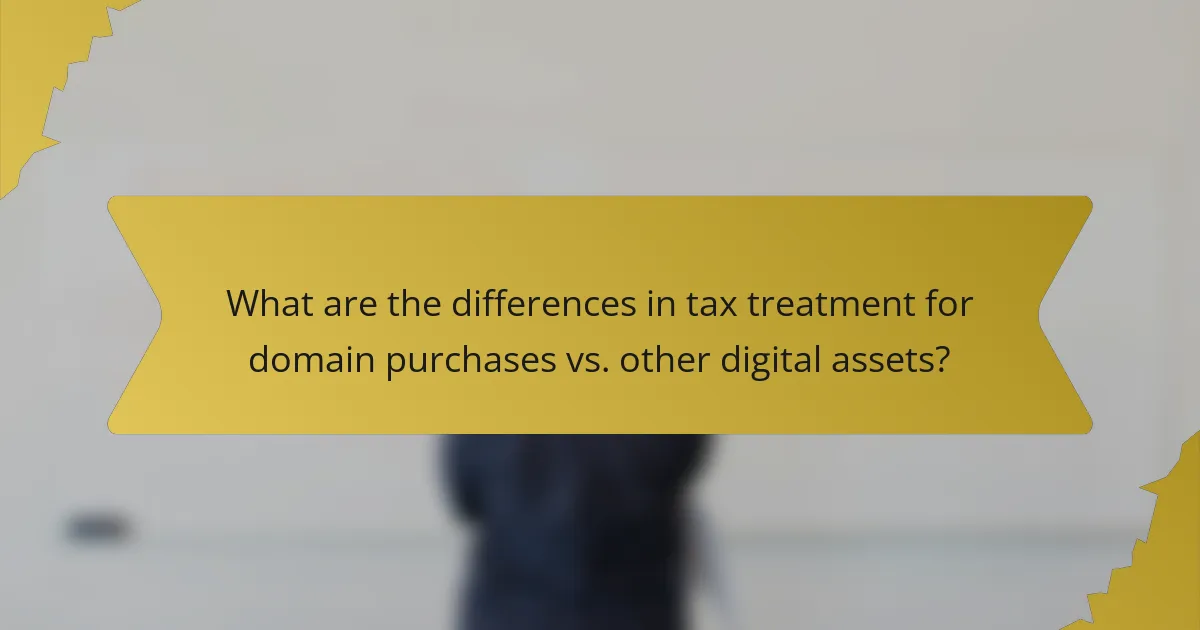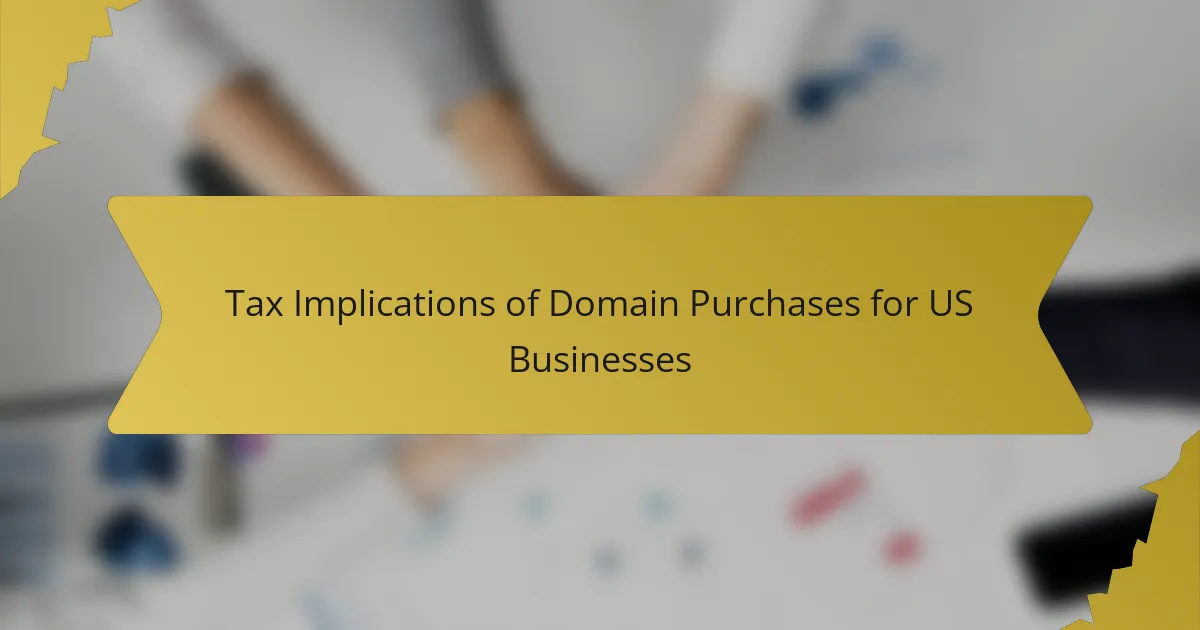For US businesses, purchasing a domain can lead to various tax implications, including potential capital gains tax upon resale and considerations for deductibility and sales tax. It is crucial for businesses to understand these factors to ensure effective financial planning and compliance with tax regulations.

What are the tax implications of domain purchases for US businesses?
For US businesses, purchasing a domain can have various tax implications, including potential capital gains tax on resale, deductibility of the purchase costs, and sales tax considerations. Understanding these factors is essential for effective financial planning and compliance.
Capital gains tax on resale
If a business sells a domain for more than its purchase price, it may be subject to capital gains tax on the profit. The tax rate can vary based on how long the domain was held; short-term gains are typically taxed at ordinary income rates, while long-term gains may benefit from lower rates. Businesses should keep detailed records of purchase and sale prices to accurately report gains.
For example, if a domain was bought for $1,000 and later sold for $5,000, the business would realize a capital gain of $4,000. This gain would be taxed according to the holding period and the business’s overall tax situation.
Deductibility of domain purchase costs
Domain purchase costs can generally be deducted as a business expense, which can reduce taxable income. The IRS allows businesses to capitalize the cost of the domain and amortize it over a period, typically 15 years. This means that businesses can spread the deduction over several tax years, which can be beneficial for cash flow management.
To maximize deductions, businesses should ensure that the domain is used for business purposes and maintain proper documentation, including invoices and payment records. This substantiation is crucial in case of an audit.
Sales tax considerations
In some states, the purchase of a domain may be subject to sales tax, while in others, it may not be. The taxability often depends on whether the domain is considered tangible personal property or a service. Businesses should check their state’s regulations to determine if sales tax applies to their domain purchases.
For instance, states like California do not impose sales tax on domain registrations, while others might. It is advisable for businesses to consult with a tax professional to ensure compliance with local tax laws and avoid unexpected liabilities.

How can businesses minimize tax liabilities on domain purchases?
Businesses can minimize tax liabilities on domain purchases by leveraging available deductions and amortization strategies. Understanding how these financial tools work can significantly reduce taxable income associated with domain acquisitions.
Utilizing Section 179 deductions
Section 179 of the IRS tax code allows businesses to deduct the full purchase price of qualifying equipment and software, which can include domain names, in the year they are purchased. This deduction is beneficial for small to medium-sized businesses looking to lower their taxable income immediately instead of spreading the expense over several years.
To qualify, the domain must be used for business purposes more than 50% of the time. The deduction limit can vary, but it generally allows for substantial write-offs, making it a strategic option for businesses investing in digital assets.
Amortization of domain costs
If a business does not qualify for Section 179, it can still deduct domain purchase costs through amortization. This process involves spreading the cost of the domain over its useful life, typically 15 years, allowing businesses to gradually reduce their taxable income.
It’s important to keep detailed records of the purchase and any associated costs. Businesses should consult with a tax professional to determine the best approach and ensure compliance with IRS regulations regarding amortization.

What are the reporting requirements for domain purchases?
Businesses in the U.S. must adhere to specific reporting requirements when purchasing domains. These requirements can vary based on the nature of the business and how the domain is utilized, impacting tax deductions and depreciation methods.
IRS Form 4562 for depreciation
IRS Form 4562 is used to report depreciation on assets, including domain names, if they are considered capital assets. If a business purchases a domain for more than a certain threshold, it may need to depreciate the cost over a period of time, typically 15 years for intangible assets.
When filling out Form 4562, businesses should detail the acquisition cost and the date the domain was placed in service. This ensures compliance and maximizes potential tax benefits. It’s advisable to consult a tax professional to determine the appropriate depreciation method for your specific situation.
Schedule C for sole proprietors
Sole proprietors must report domain purchases on Schedule C, which is part of their personal income tax return. This form allows them to deduct business expenses, including the cost of domain registration and renewal fees, directly from their income.
When completing Schedule C, sole proprietors should categorize domain expenses under “Other Expenses” and provide a brief description. Keeping thorough records of these purchases is essential for substantiating deductions in case of an audit.

What are the differences in tax treatment for domain purchases vs. other digital assets?
Domain purchases are generally treated as capital assets for tax purposes, similar to other digital assets, but there are key distinctions in how they are depreciated and expensed. Businesses must consider the specific tax implications, including the potential for immediate expensing versus capitalizing costs over time.
Domains vs. websites
Domains are often treated differently from websites in tax terms. While a domain name itself is a capital asset, the website built on that domain may incur various expenses that can be deducted as business costs. For example, costs associated with website development, maintenance, and hosting can often be deducted in the year they are incurred, whereas the purchase of a domain may need to be capitalized and amortized over a longer period.
When purchasing a domain, businesses should keep in mind that the IRS typically allows for a 15-year amortization period for intangible assets, which includes domain names. This means that the cost of the domain can be spread out over many years, impacting cash flow and tax liabilities.
Domains vs. digital marketing tools
Digital marketing tools, such as SEO software or email marketing platforms, are usually treated as ordinary business expenses. Unlike domains, which may require capitalization, these tools can often be fully deducted in the year they are purchased. This difference can significantly affect a business’s tax strategy and cash flow management.
When assessing the tax implications of domain purchases versus digital marketing tools, businesses should consider their overall marketing budget and strategy. Investing in digital marketing tools may provide immediate tax benefits, while domain purchases could lead to long-term asset appreciation. Balancing these investments can optimize both operational effectiveness and tax efficiency.

How do state taxes affect domain purchases in different US states?
State taxes can significantly impact the cost of domain purchases for businesses in the US. Each state has its own regulations regarding sales tax, which can affect the overall expenses associated with acquiring a domain name.
Variations in sales tax by state
Sales tax on domain purchases varies widely across states. Some states impose a sales tax on digital goods, including domain names, while others do not. For example, states like California and New York charge sales tax on domain registrations, whereas states like Florida may not.
Businesses should check the specific sales tax rate in their state, as it can range from around 0% to over 10%. Additionally, online purchases may be subject to different tax rules than physical goods, so understanding local regulations is crucial.
State-specific deductions and credits
Some states offer deductions or credits that can mitigate the tax burden on domain purchases. For instance, a business might be able to deduct the cost of domain registration as a business expense on their state tax return, reducing taxable income.
It’s important to consult with a tax professional familiar with state laws to identify any available deductions or credits. This can help businesses maximize their tax efficiency and reduce overall costs associated with domain purchases.

What are the implications of domain purchases for international businesses operating in the US?
International businesses that purchase domains while operating in the US must consider various tax implications, including potential deductions and reporting requirements. These factors can significantly impact their overall tax liability and compliance with US tax regulations.
Tax treaties and foreign ownership
Tax treaties between the US and other countries can influence the tax implications of domain purchases for foreign businesses. These treaties often provide reduced withholding tax rates or exemptions, which can benefit international companies acquiring domains in the US.
Foreign ownership of domains may also trigger specific reporting requirements under US tax law. Companies should consult with tax professionals to understand how these treaties apply to their situation and ensure compliance with any necessary documentation.
Transfer pricing considerations
Transfer pricing rules are crucial for international businesses, especially when domains are purchased from related entities. The IRS requires that transactions between related parties be conducted at arm’s length, meaning the price should reflect what unrelated parties would pay under similar circumstances.
When valuing domain purchases, businesses should document their pricing methodology and ensure it aligns with market rates. This helps avoid disputes with tax authorities and potential penalties. Companies may also benefit from conducting a benchmarking analysis to support their pricing decisions.

What emerging trends should businesses consider regarding domain purchases and taxes?
Businesses should be aware that the landscape of domain purchases and their tax implications is evolving. As digital assets gain prominence, understanding the associated tax responsibilities is crucial for compliance and financial planning.
Impact of digital asset regulations
Digital asset regulations are becoming more defined, impacting how domain purchases are treated for tax purposes. As the IRS and other regulatory bodies clarify their positions, businesses must stay updated to ensure they categorize domain purchases correctly, which can affect deductions and capital gains.
For example, if a domain is considered a capital asset, its sale may result in capital gains tax. Businesses should maintain clear records of purchase prices and any associated costs to substantiate their claims during tax filings.
Future tax reforms affecting digital assets
Future tax reforms may introduce new guidelines specifically targeting digital assets, including domains. Businesses should monitor legislative developments that could change how domains are taxed, potentially affecting both acquisition costs and resale values.
To prepare, companies should consult with tax professionals to evaluate their current practices and adjust their strategies accordingly. Staying proactive can help mitigate risks associated with unexpected tax liabilities as reforms unfold.
